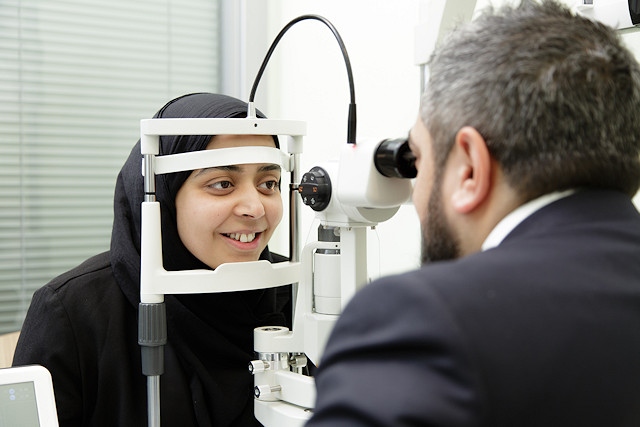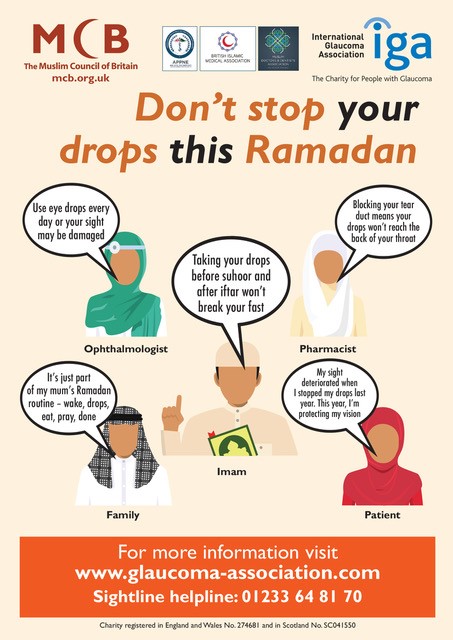Ramadan glaucoma health campaign launched amid fears that patients are putting their eyesight at risk
Date published: 03 May 2019

Some glaucoma patients stop using drops during Ramadan
Following hospital and patient feedback indicating that some Muslims stop using their eye drops during Ramadan putting their vision at risk, a campaign has been launched by the International Glaucoma Association (IGA) to advise on how to put in eye drops without breaking the fast.
The IGA reports that some Muslim glaucoma patients stop using drops during Ramadan, as they believe that any liquid trickling down the back of their throat and therefore entering the body cavity, breaks their fast. A study by St Paul”s Eye Unit in the Royal Liverpool University Hospital of a group of Muslims showed that 45.5% of those surveyed believed using eye drops would nullify the fast, while only 20% would continue to use eye drops for a non-painful eye condition such as glaucoma.
Stopping drops even for a short period of time can cause permanent loss of vision.
The IGA estimates there are at least 50,000 Muslims with glaucoma in the UK, while those with suspected glaucoma or ocular hypertension may number up to 140,000. Some ethnicities are at particular risk of glaucoma. Prevalence of the most common type of glaucoma, known as primary open angle glaucoma, is up to four times higher amongst people of African origin, while individuals of Asian origin have higher rates of a rarer form, known as angle-closure. A 2010 study showed that Africa had the highest ratio of glaucoma to adult population. Adherence to eye drops is therefore especially important amongst these groups.
The Muslim Council of Britain (MCB) supports the IGA”s Ramadan campaign to raise awareness of this issue, confirming that all Islamic schools of thought agree that using eye drops does not invalidate the fast unless the eye drops reach the throat, which is unlikely. Should Muslims remain concerned, they can put in their drops before dawn (suhoor) or after dusk (iftar). Moreover, Muslims should take care of their health throughout the month and not cause themselves or others hardship.
The IGA has produced posters and flyers in English and in six different languages most common among Muslims, (Urdu, Punjabi, Bengali, Somali, Gujurati and Arabic) to advise on how to use eye drops during Ramadan without breaking the fast, using a method known as punctal occlusion.

This is where patients close the tear duct by putting finger pressure at the corner of the eye next to the nose immediately after putting in drops. This means that fluid stays in the eye and does not drain into the throat and so cannot be tasted. The materials will be distributed to mosques, pharmacies and hospitals and are also available to order from the IGA.
The IGA has also partnered with Muslim medical associations in the UK, including the British Islamic Medical Association, Muslim Doctors and Dentists Association UK and the Muslim Doctors Association to assist in disseminating this message across the UK.
Glaucoma is a group of eye conditions in which the main nerve to the eye (the optic nerve) is damaged where it leaves the back of the eye. This nerve carries information about what is being seen from the eye to the brain and as it becomes damaged vision is lost.
Glaucoma is more common in people over the age of 40 and as there are no early symptoms of glaucoma, regular eye health checks (every two years, or every 1-2 years for over 40s with glaucoma in the family) are recommended.
Usman Shaikh BSc (HONS) Prof Cert Med Ret, the Muslim Doctors Association’s Optometry Lead, commented: “I can only urge Muslim glaucoma patients to continue their glaucoma drops during Ramadan. Glaucoma can slowly damage the optic nerve in the eye reducing vision and causing visual field loss, without a person even realising if the eye pressure is not controlled for even a short period of time such as during Ramadan.
“Muslims should remember that it is not in line with the teachings of Islam to knowingly allow damage to your body which is trusted upon you from God.”
Commenting on the Ramadan campaign, Subhash Suthar, IGA Development Manager, commented: “Glaucoma is the most common cause of preventable blindness and for most glaucoma patients, daily eye drops are a simple solution to control their condition and save their sight but we know from calls to our helpline Sightline and from discussions with opticians and hospitals that some Muslim patients stop using their drops during Ramadan for fear of breaking their fast.
“Sadly subsequent appointments at their ophthalmologist or optometrist show that their vision has been damaged. We’re therefore encouraging all Muslim glaucoma patients and their friends and family to take note of how to manage their drops throughout the month.”
The IGA works with all professionals involved in glaucoma management to educate about the need for good eye drop use and compliance. It helps to set up local patient support groups within hospitals and has some simple tips and films available on their website.
Do you have a story for us?
Let us know by emailing news@rochdaleonline.co.uk
All contact will be treated in confidence.
Most Viewed News Stories
- 1Royton haulage firm fined after Rochdale dad went to work and didn’t come home
- 2Unique colour and sound experience comes to Rochdale in May
- 3Ogden family announces intention to invest £2m in Rochdale AFC
- 4Man convicted after police car filmed driving dangerously in Kirkholt
- 5A new train station for Rochdale is being considered at Belfield
To contact the Rochdale Online news desk, email news@rochdaleonline.co.uk or visit our news submission page.
To get the latest news on your desktop or mobile, follow Rochdale Online on Twitter and Facebook.


